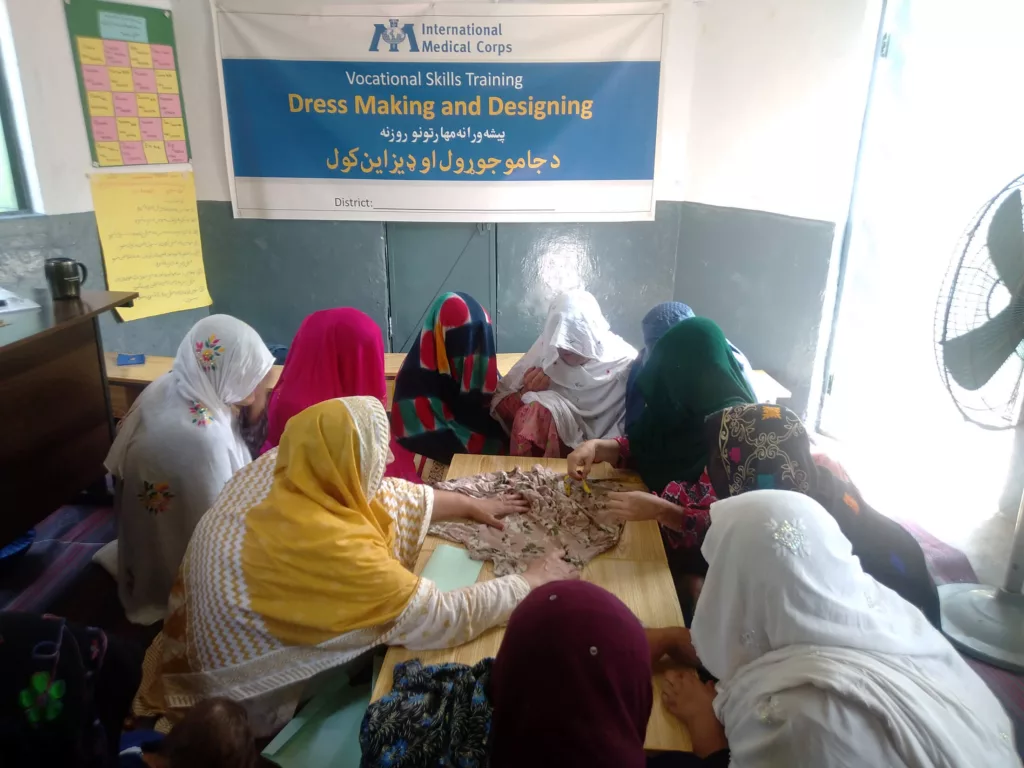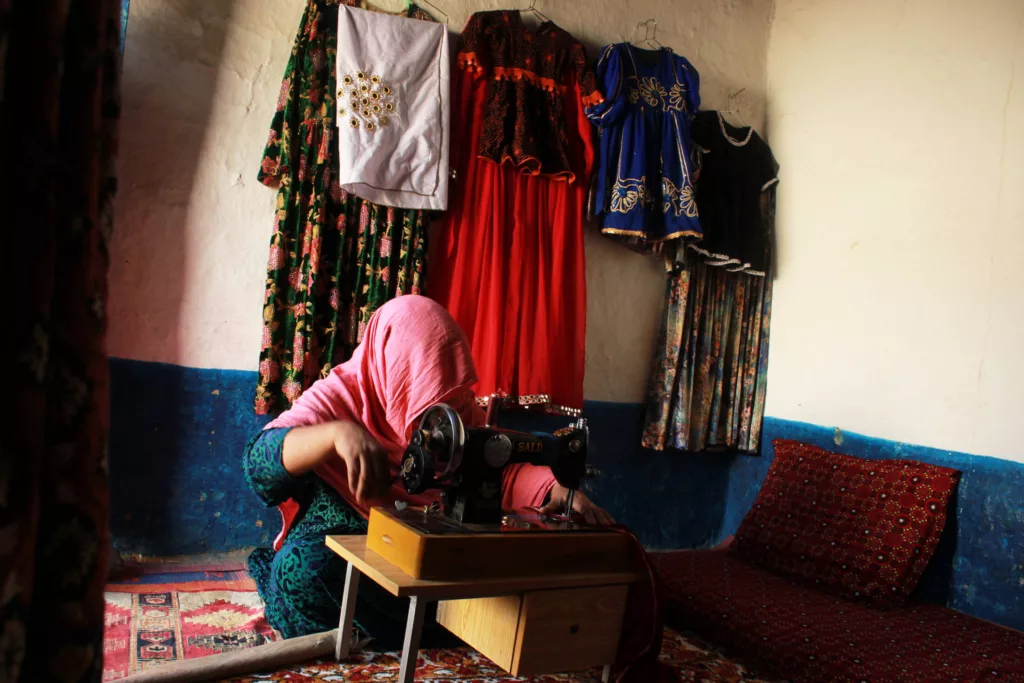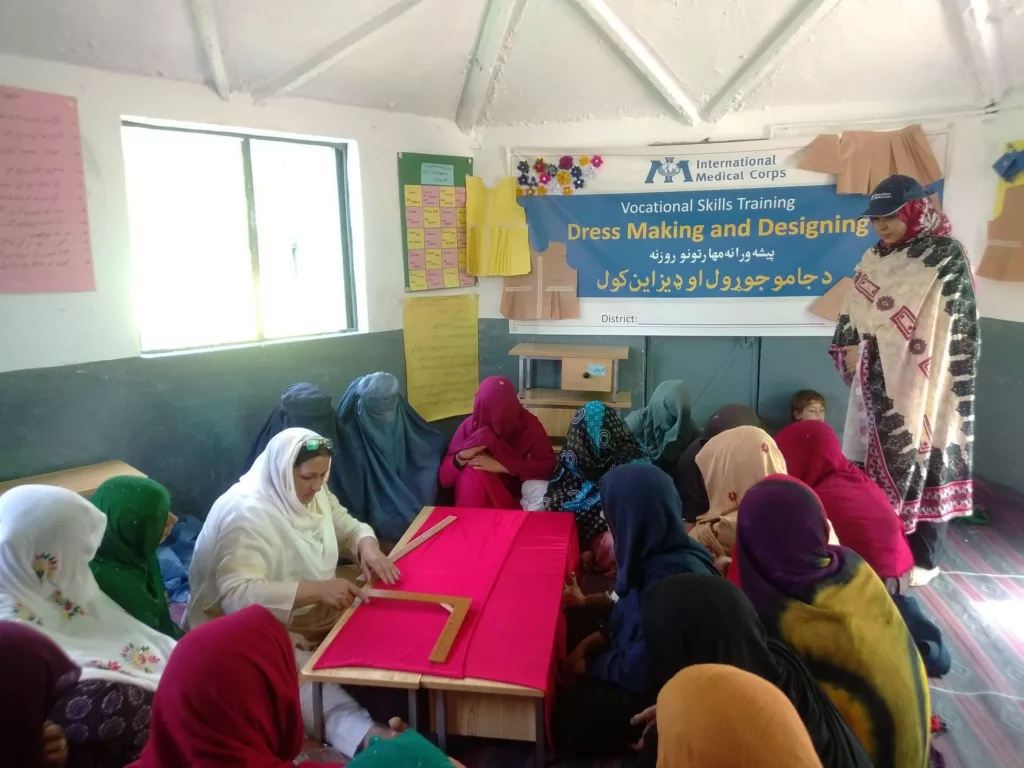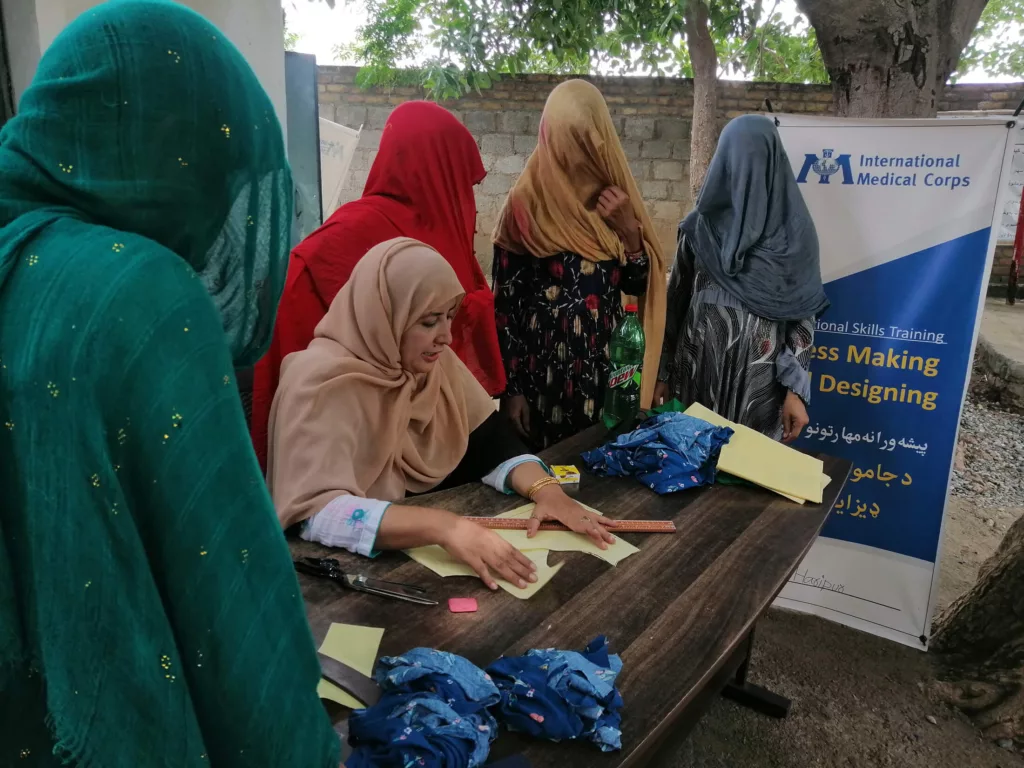Due to entrenched income inequality, many women around the world struggle to earn enough money to support their families. For Afghan refugee women in Pakistan, this challenge can be even more overwhelming. Due to cultural constraints, they often don’t have access to the training courses necessary to learn income-generating skills. Through our women’s economic empowerment (WEE) program, International Medical Corps provides vocational training—including tailoring, sewing, dressmaking and business management—at our women’s and girls’ safe spaces.
In Pakistan, more than 45% of the Afghan refugee population lives in Khyber Pakhtunkhwa province. Here are the stories of three women (whose names have been changed to protect their privacy) in the province who benefitted from our WEE program there.
Nadia
Nadia, 28 years old, lives in the refugee village of Khaki with her husband and four small children. Nadia’s husband is chronically ill, suffering from kidney disease. He is a laborer by trade, but due to his illness, he cannot do strenuous work, leaving his family in dire economic conditions. Nadia assumed the role of breadwinner in the family while continuing to be a caring mother.
After enrolling in an International Medical Corps training program, Nadia worked tirelessly for three months, learning the art of making beautiful dresses and gaining valuable skills in business management. Her husband also attended our economic and social empowerment (EASE) discussion series.
“Since attending the EASE discussion series, my husband’s support at home has increased while I have started earning an income,” explains Nadia. “He helps me by looking after our children. He listens to me now and goes to the market to procure stitching accessories, as I cannot go there [by myself] due to cultural constraints.”
“Nadia was determined to make the most of this opportunity and secure a better future for her family,” says Gulnaz, an International Medical Corps Site Manager. “When she completed the course, she received a certificate for her achievements and was given the tools she needed to start a business at home.”
With her newfound skills, Nadia began stitching dresses for people in her community. She reached out to other women, forming bonds in the surrounding areas. In just two months, her hard work and determination paid off—through a friend she made in the tailoring course, she received an order for a bridal dress and other dresses for the same wedding. Nadia put her heart and soul into designing the most exquisite bridal dress. When she completed the order, she was overjoyed with the earnings.

“This was a significant success not only for Nadia but also for International Medical Corps,” says Shahida, an International Medical Corps WEE Officer. “With the money she earned, Nadia can provide better care for her husband’s medical needs and her children with a more comfortable life.”
Nadia’s story has been an inspiration in the refugee village. She showed that anyone can overcome difficult circumstances and succeed with determination, hard work and the right opportunities.
“Nadia’s success not only improved her family’s life but also serves as a ray of hope for others in the camp, reminding them that they too can create a better future for themselves and their loved ones,” Shahida adds.
Gulmeena
Gulmeena, 45 years old, lives in a two-room house made of mud and bricks in the refugee village of Padhana. Gulmeena’s 11 children—eight daughters and three sons—all depend on her, as her husband, Noor Hassan, is chronically ill. Without the money for treatment and care, his condition has worsened over time. He cannot work and support his family, so Gulmeena must work outside the house, breaking cultural norms.
Given her circumstances, Gulmeena was selected for the WEE program, where she completed the dressmaking, designing and business management training courses. To help her start her home business, International Medical Corps provided her with a sewing machine and toolkit, including scissors, a measuring tape, rulers, a box of threads of different colors and loose cloth.

“The money I earn from stitching goes to groceries, utilities and medical treatment for my ailing husband,” says Gulmeena. “I also put some in the savings box to collect enough to build another room in the house since two rooms are not enough for my family of 13.”
The savings from stitching enabled Gulmeena to buy a secondhand sewing machine for her daughter, who wanted to help her mother and their family.
“By training her daughter, Gulmeena has not only transferred the skill to ease her economic problems but also has prevented her daughter from gender-based violence in the future, as she empowered her by providing this skill,” explains Shahida.
Rabia
Rabia, 36 years old, lives in the refugee village of Panian-2. She is a mother of three children. Tragically, her three-month-old son died last year, leaving Rabia devastated. Looking after her other two children, who have special needs, became a tiring responsibility for her during this phase. Her husband, Nishad Muhammad, is a laborer at a kiln. Nishad has epilepsy, and due to his condition, he’s unable to earn enough money to fully support their family.
Rabia approached our team during a community visit. She explained that life seemed like an unbearable burden, and that she needed help earning an income to support her family. The team recommended that Rabia enroll in the WEE training program, as she belonged to a household headed by a chronically ill person.

She chose a vocational skills course in dressmaking and dress designing, followed by a five-day business management course. At first, she found it hard to concentrate as she was still mourning the loss of her son. Gradually, she became a more engaged and active participant. Dressmaking and creating dress designs became psychosocial support for her, helping her to cope with her loss and challenges. She also made new friends and enjoys working with other trainees.
“With this training, I felt a change in my thinking patterns. I plan to start my own small business of dressmaking and designing once I finish the course,” says Rabia. “I hope this training will enable me to achieve what I have planned, and earn money to meet my children’s needs.”
“As a result of her determination and newfound passion for her work, Rabia’s outlook on life has improved significantly,” says Gulnaz. “She now feels better and looks forward to a brighter future for herself and her children.”
“Rabia is a quick learner, and the samples she made are fine enough to be compared with any experienced local tailor,” says Marium, the vocational skills training center trainer. “The International Medical Corps program is life-changing for women enrolled here.”
Last year, International Medical Corps trained 100 women in Pakistan through this program. We plan to enroll 180 more women this year, including survivors of gender-based violence, in other refugee villages.
Saeeda Zardad, Neelam Begum and Atiya Nawaz contributed to this story.
